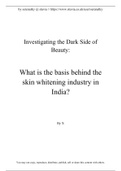by serenalky @ stuvia // https://www.stuvia.co.uk/user/serenalky
Investigating the Dark Side of
Beauty:
What is the basis behind the
skin whitening industry in
India?
By X
You may not copy, reproduce, distribute, publish, sell or share this content with others.
, by serenalky @ stuvia // https://www.stuvia.co.uk/user/serenalky
Contents Page
3
Introduction
5
History
7
British Rule
10
The Present
13
Literature and Media
15
The Psychology
17
Future
19
Conclusion
20
Evaluation
23
Bibliography
27
Project Proposal Form
29
Extended Project Timeline
You may not copy, reproduce, distribute, publish, sell or share this content with others.
, by serenalky @ stuvia // https://www.stuvia.co.uk/user/serenalky
Introduction
From its advent 6000 years ago, and being present in almost every society across the world, it
is a justifiable statement to believe the cosmetic industry has influenced human civilisation.
Cosmetics have impacted the British economy for centuries, currently marking a 7% market
[1][2]
share of the economy and growing by 15% annually. The growth of cosmetics can be
seen as advantageous for some: some view it as a gateway for female liberation and a means
of female autonomy. [3] Others believe makeup is inherently anti-feminist, due to pressure to
conform to a patriarchal society. [4] For one country, however, the cosmetic industry can be
seen as a catalyst in transforming rights for women.
India, the second most populous country in the world, and seventh largest country by area, is
a country of tremendous growth. [5][6] Being the world's fastest growing in the G20 developing
nations in the last quarter of 2016, the wealth gap has diminished, and India seems to be
making economic progress. [7] Despite this, India still appears to be fairly backwards in terms
of gender equality. Having a 44.3 female to 43.5 male infant mortality rate, compared to a
32.6 to 37 female to male ratio worldwide, is instrumental in conveying the anti-female
rhetoric propagated in India. Whilst India is known as the ‘rape-capital,’ sex-selective
[8]
abortion also demonstrates a high disparity between Eastern and Western culture. Both the
growth of the Indian economy and Indian gender-inequality reflect an alarming trend in
society: the birth of skin-whitening products.
Skin colour has always been a sensitive topic in Indian society, with dark-skinned people
often described as ‘olive-skinned.’ The most popular skin-whitening product in India,
plastered across billboards and ubiquitous in local advertising, is Unilever’s ‘Fair and
Lovely’ cream. Introduced into the Indian market in 1975 and having a large presence in over
30 countries, it is not the first skin-lightening product in India’s society, but it now composes
of 80% of the industry. Having the slogan of ‘Rescripting Destiny’, the company prides itself
on pioneering further to develop innovative whitening solutions. [9] Speaking to a 15 year old
cousin of mine, she does not take a second look at billboards such as these, and considers
seeing such advertising on her commute to
∆ Image highlighting one of the many forms
school as ordinary in her day-to-day life. For a of advertising ‘Fair and Lovely’ utilise to
Westerner, and as someone who no longer perpetuate their message. Source:
https://www.flickr.com/photos/adam_jones/
believes in the ‘whiter is better’ rhetoric, seeing 13103725423
such advertising is absurd, and is almost
You may not copy, reproduce, distribute, publish, sell or share this content with others.
, by serenalky @ stuvia // https://www.stuvia.co.uk/user/serenalky
concerning. It is interesting to note many Westerners pay to darken their skin, whilst Indian
girls in the East risk severe health problems to
relinquish themselves of their identity.
Furthermore, it is almost ironic that the
company proudly claims it does not test on
animals, and even utilises marketing strategies
such as having a scholarship scheme available
for teenagers, yet their products contain
[22]
dangerous levels of carcinogenic chemicals.
Some products are available in sachet form, with prices starting from 5 Rupees, equivalent to
barely 5 pence in GBP. [9] The Indian skin-whitening industry also appears to prey on men as
well as women, with the product ‘Fair and Handsome’ marketed to insecure Indian men. Men
are often neglected in the cosmetic industry, but due to the rise of social media and
advertising, more and more men choose to risk damage to their skin, by undergoing skin-
whitening. [9] The sheer dominance of ‘Fair and Lovely’ in Indian society is not unfounded, as
the skin-whitening epidemic stretches much further than from 1975.
Earlier this year, a conversation with my 7 year old niece provided inspiration when choosing
a topic to discuss in my EPQ. She remarked to me that her mother encouraged her to drink
milk daily, not in hopes of attaining calcium-fortified bones, but instead, in hopes of
obtaining whiter skin. After spending countless nights deliberating about her words, I was
motivated to uncover where my niece and her mother had developed this belief from, and
determine whether other Asian girls in my local community also shared this belief. In this
project, I aim to uncover the basis of the skin-whitening industry India. I have left the
question purposefully ambiguous because I would like to determine whether there a single
catalyst that occurred in propagating skin-whitening, or a number of factors that have
contributed to this epidemic. I also endeavour to reflect upon my current A-Level choices
when writing this EPQ. I aim to use my knowledge of English Literature to determine if any
publications from Indian authors can provide information into the propagation of the
industry. Furthermore, my knowledge of Psychology would allow me to investigate
psychological theories and movements such as the feminist ideology, to determine if this had
impacted the industry at all. Thus, in the following project, I will examine the historical,
social, cultural and moral factors in propagating the belief that ‘whiter skin is better.’, and
uncover the basis behind the skin whitening industry in India.
You may not copy, reproduce, distribute, publish, sell or share this content with others.





